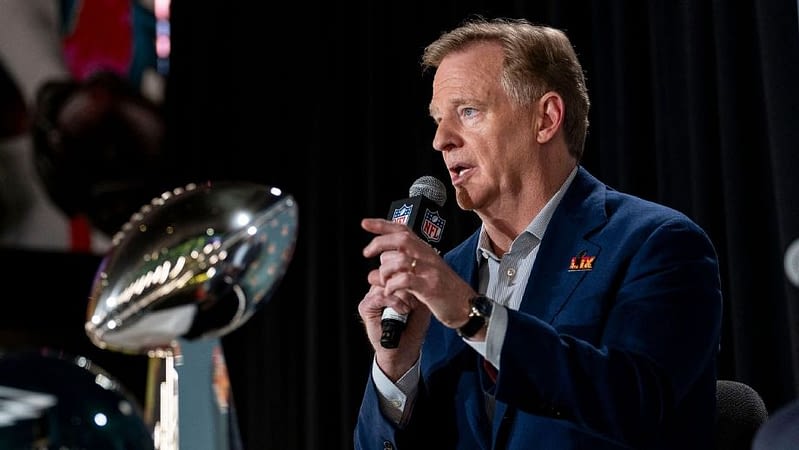Rooney Rule: Progress and Challenges in NFL Diversity Efforts
In a recent conversation with ESPN, two of the original architects of the NFL’s Rooney Rule expressed their agreement with Commissioner Roger Goodell’s assertion that the league’s diversity initiatives are making a positive impact. However, they also highlighted areas where further progress is needed, particularly in the recruitment of offensive coordinators, a crucial stepping stone to head coaching positions.
As the NFL continues to navigate the complexities of diversity and inclusion, recent challenges to such efforts in both business and government sectors have raised questions about the league’s commitment to the Rooney Rule. This rule mandates proactive measures to create advancement opportunities for minority and women coaches and executives.
During his pre-Super Bowl press conference in New Orleans, Goodell reaffirmed the league’s dedication to the Rooney Rule, emphasizing that it is not merely a trend but a moral imperative to promote diversity. “I think we’ve proven to ourselves that it does make the NFL better,” he stated confidently.
Despite these positive affirmations, Cyrus Mehri and John Wooten, who played pivotal roles in the creation of the Rooney Rule in 2003, believe there is still room for improvement. Mehri pointed out the lack of diversity among NFL offensive coordinators, a position that often serves as a gateway to head coaching roles.
Currently, there are no Black offensive coordinators in the NFL. The Giants‘ Mike Kafka, who is part-Puerto Rican, is the only offensive coordinator who attended the NFL’s minority-focused accelerator program. “There’s been a historic challenge when it comes to Black coaches in the offensive coordinator position,” Mehri told ESPN. “There’s always been a shortfall. We’re nowhere near where we could be or should be. And that creates a headwind against representation in the head coaching positions because that’s the primary pipeline.”
Mehri further explained that “more than half of head coaching jobs are filled through the offensive coordinator position.” He added, “And then maybe around 30% defensive coordinator, maybe 10% from others like either former head coaches or college ranks. So that’s the key place where the NFL is not on all cylinders yet.”
Despite its imperfections, Wooten, 88, a Hall of Famer and former player who began his NFL career in 1959, believes the Rooney Rule is making a difference. He later served on the Cowboys‘ staff and became the first chairman of the Fritz Pollard Alliance, which advocates for more diversity in the NFL. “When I played in the NFL, we never had a Black coach in that room, period. When you look at this weekend’s game, look at the men you’re going to see on the sideline,” Wooten said. “That’s what the Rooney Rule has done. I feel that we have got to keep pushing.”
As of the start of the 2024 season, Black players made up more than half of NFL players, yet there were only seven Black head coaches, or 22%, according to The Associated Press. Among the 32 teams, there were nine minority head coaches, including the Jets‘ Robert Saleh, who is of Lebanese descent, and the Panthers‘ Dave Canales, who is Latino.
An NFL spokesman did not immediately return a request for comment.
According to the NFL’s Diversity and Inclusion Report, from 2012 to March 2023, 40 of the 77 head coaches previously held offensive coordinator roles for at least one season. Comparatively, 24 of the 77 head coaches hired during that period came from defensive coordinator roles.
- One of the seven head coaching vacancies this season has been filled by a minority coach: Aaron Glenn, who was hired by the Jets. His most recent role was defensive coordinator for the Lions.
- Of the five other head coaching roles filled, three most recently came from an offensive coordinator role, two most recently were head coaches.
Mehri compared the recruiting preference among offensive coordinators to the bias that existed for decades regarding Black quarterbacks in “thinking” positions in the NFL. He highlighted this year’s playoffs to demonstrate how racial representation has evolved: Three of the four conference-championship quarterbacks were Black, including both QBs in Sunday’s Super Bowl. He said the lack of minority offensive coordinators is “holding back the NFL.”
“Otherwise, the Rooney Rule has been an enormous success,” he said.
Since the 2023 U.S. Supreme Court decision that ended affirmative action in the college admission process, conservative activists have pressured public companies, including the NFL, to end diversity programs.
America Legal First, founded by top President Trump aide Stephen Miller, filed a letter with the Equal Employment Opportunity Commission in 2024, arguing that the Rooney Rule constituted a “quota” system that “resulted in fewer opportunities for similarly situated, well-qualified candidates who are not minorities.”
Miller is now a deputy chief of staff in the Trump administration, which has mandated the elimination of all diversity, equity, and inclusion programs in the federal government and entities receiving federal funds.
Mehri argues that the Rooney Rule is about creating equal opportunities, not equal outcomes. The NFL has simply added more candidates to the slate — not reduced the candidate spots available to whites, he said, adding that over the years more white coaches have been interviewed for top jobs than Black coaches.
The pipeline problem also stems from hiring practices at the college level, according to Richard Lapchick, who created the annual Racial and Gender Report Card in 1988. This year, Notre Dame’s Marcus Freeman became the first Black head football coach to reach the national championship game.
“This is 2025, and we have the first Black head coach coaching in a championship game,” Lapchick said. “What does that tell us about our hiring practices? It tells us we have a long way to go at the college level.”
Changes to the Rooney Rule have included a gradual expansion of interview slates to include a minimum number of minority or women candidates. The NFL introduced compensatory draft picks if a minority coach transferred to another team.
In 2022, the league required teams to hire an offensive assistant who was a minority or woman. Critics have alleged that the interviews can — and have at times been — performative, as if teams are just checking a box, especially if teams have already identified a top candidate. A still pending federal lawsuit against the league by former Dolphins coach Brian Flores and two other Black coaches alleges hiring discrimination, including sham interviews.
Regarding the DEI challenge from Miller, Jean Kuei, a partner and head of the labor and employment group at the law firm Pillsbury, Winthrop, Shaw, Pitman, said that while some corporations and organizations should be concerned, programs like the Rooney Rule are not discriminatory because the hiring outcome isn’t determined by race.
The rule “increases the slate,” Kuei said. If there are, say, six candidates being considered but no diverse candidates, the rule says “you have to add two for certain positions. So now you’re just interviewing eight, but you’re not taking away two of the six that you were previously going to interview anyway.”
Wooten was emphatic that the NFL is on the right track, and that the Rooney Rule is succeeding. “And that’s why we’re going to keep fighting when we need to fight,” he said. “But we’re winning, believe me when I tell you this.”
Originally Written by: Xuan Thai





















